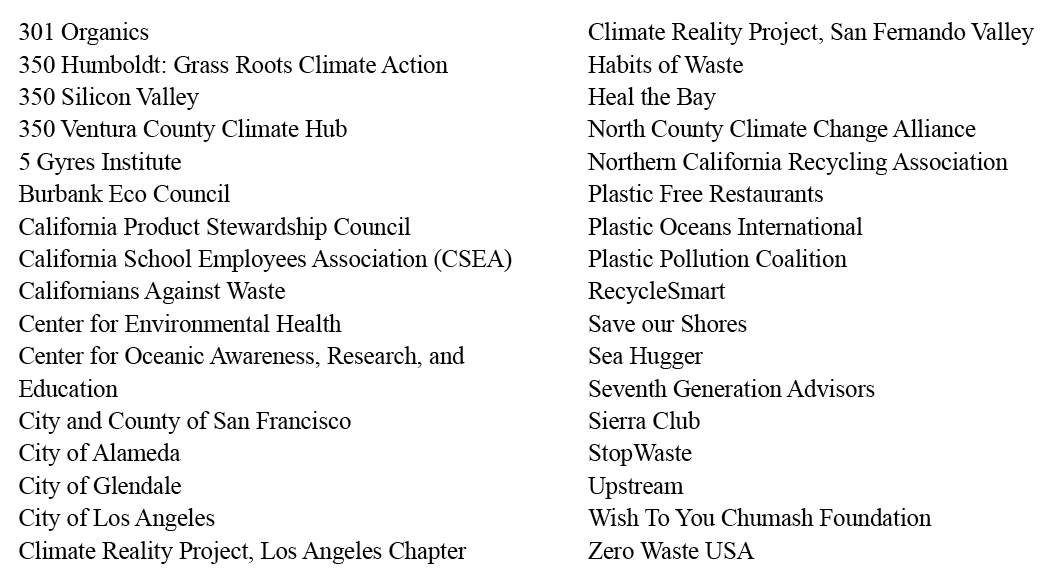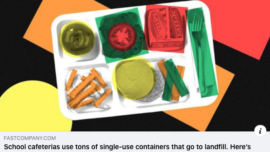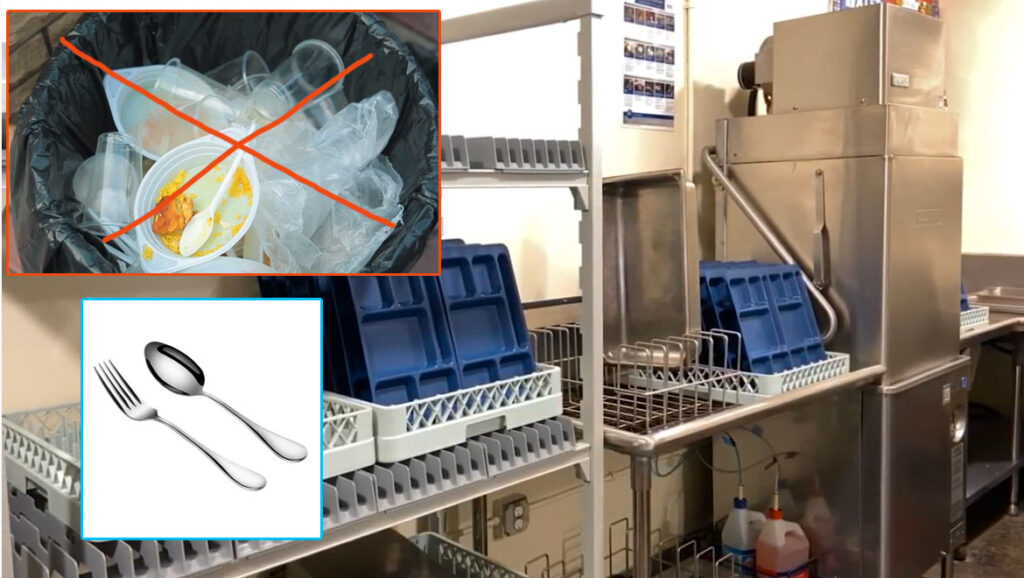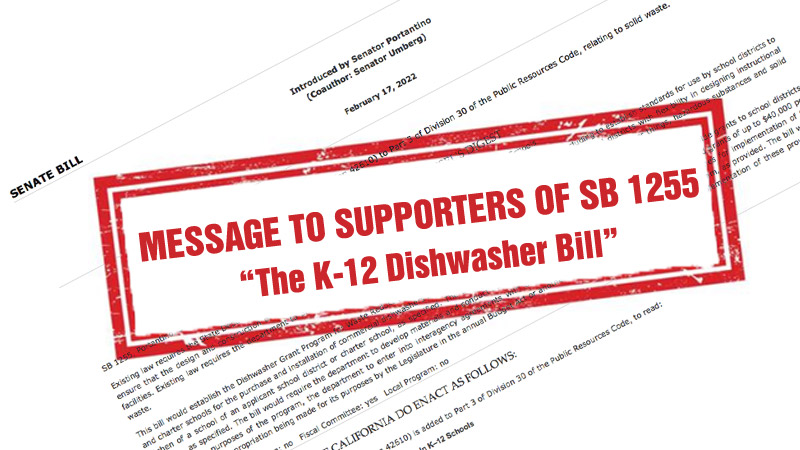AN OPEN LETTER TO SUPPORTERS
Posted Friday, October 7, 2022
Dear SB1255 Supporters,
On September 28, 2022, Governor Newsom vetoed SB 1255, the “Dishwasher Bill”, sponsored by CA State Senator Portantino. This upstream waste prevention bill would have provided grants up to $40,000 for K-12 public and charter schools in California to purchase and install dishwashers, to reduce the enormous tide of single-use waste stemming from school kitchens such as disposable trays and utensils. The grants also would have helped future proof district budgets from the escalating costs of their purchasing and disposal.
SB 1255 had overwhelming support from 35 organizations and cities, including: 301 Organics, 5 Gyres Institute, California Product Stewardship Council, California School Employees Association (CSEA), Californians Against Waste, Center for Environmental Health, City and County of San Francisco, the Cities of Alameda, Glendale and Los Angeles, Heal the Bay, Plastic Pollution Coalition and the Northern California Recycling Association. With no opposition in both the CA Assembly and Senate during the entire legislative process, sponsors and supporters of this bill are extremely disappointed with the Governor’s veto.
Glendale Environmental Coalition (GEC) and GREEN LUNCHROOM (GL) are grateful to Senator Portantino for championing this bill and for not giving up on this effort! The Senator recognizes the potential impact of incentivizing the purchase of dishwashers for our schools and has indicated that he will continue to seek funding for them in the new year:
“I was excited when the GEC brought forward this terrific creative solution to eliminating single-use waste. It recognized that we had it right decades ago when schools washed and reused plates, knives, and forks. With today’s environmentally sound water-efficient dishwashers, we can make a positive impact for this generation and the next. Although I was disappointed that SB 1255 was vetoed, I look forward to working with the Glendale Environmental Coalition and Green Lunchroom to achieve our goal of reducing waste in our schools and I’m optimistic we will implement a dishwasher installation plan in the future,” stated Senator Portantino.
The Governor’s veto statement, included the following:
“…I appreciate the author’s intent to be responsive to both the need to improve school water conservation and reduce waste in schools. However, the 2021 and 2022 Budget Acts included $750 million Proposition 98 General Fund for schools to purchase and upgrade school kitchen equipment and infrastructure to support universal meals. Purchasing commercial dishwashers is an allowable use of these funds, making a new grant fund for this purpose unnecessary. Schools can and should use these funds to purchase and install these dishwashers as they deem appropriate…”
Unfortunately, this reasoning misses the point of the bill. No matter how much money is set aside for kitchen upgrades, school districts will not prioritize the installation of dishmachines, a waste prevention measure, over the many competing needs of the kitchen, such as updating outdated service lines, replacing failing refrigerators and ovens and general kitchen remodeling. As one Nutrition Services director stated, “A dishwasher is of course helpful, but when the rest of the equipment and structure around it is crumbling it’s not a top priority.”
This bill was intended to be a separate source of funding to incentivize waste reduction, to confront the enormous impact of school cafeteria waste in California.
The co-sponsors of this bill, Glendale Environmental Coalition and Green Lunchroom, ask that you let Gavin Newsom know you are disappointed that he did not sign SB 1255 into law and ask that he reconsider the value of incentivizing the purchase of dishwashers for schools in next year’s budget.
Contact the Governor: Leg.Unit@gov.ca.gov
We also invite school districts to weigh in. What is your perspective? Please let us know by emailing us at contact@gec.eco or greenlunchroom@yahoo.com
FACT SHEET: Dishwasher Grant Program for Waste Reduction in K–12 Schools and Community Colleges.(2021-2022)
Learn more about this bill, and the GUSD Pilot Program that inspired it: www.gec.eco/sb1255
Thank you to all of the bill’s supporters! We appreciate you!

How installing industrial dishwashers helps future proof school budgets:
A secondary benefit of moving to reusables is reduced costs to school districts over the lifespan of the dishmachine. Aside from the tremendous environmental and educational impacts, installing a dishmachine is a wise financial investment. Glendale Unified School District’s Benjamin Franklin Elementary’s pilot program study demonstrated a return on investment (ROI) for the purchase of an industrial dishmachine, plus its installation and related kitchen upgrades after approximately 4 years, with a savings of approximately $7,000 annually thereafter. Over the average 15 year expected lifespan of an industrial dishmachine, that’s a $77,000 savings over purchasing single use items, money that could be invested back into the kitchen budget for staff overtime or increased pay. With a grant for the initial purchase and installation costs, that savings could be over $100,000.
This savings did not include the future, rising costs of the single use items. It also did not include the very real (and rising) costs of their disposal.
Consider the sectioned trays often used in serving lines. There are two main choices – cheap, polystyrene trays and more expensive fiber-based trays. Items made from polystyrene (styrofoam) have known environmental health risks associated with their use and disposal AND they will likely be outlawed completely in the State of CA as SB 54 matures. SB 54 will ban expanded polystyrene foodware by January 1, 2025 unless industry is able to demonstrate a 25% recycling rate for the prior year as determined by CalReycle. It is widely predicted that polystyrene will NOT be able to meet those thresholds, due to the lack of recycling facilities for this material and the cost ineffectiveness of doing so.
This leaves districts with one real option, fiber based trays. Now that SB 1383 is in place, as school districts phase in mandated organic waste recycling, the fiber based trays that are the superior choice when it comes to the two main tray options will quickly fill organic waste recycling containers and require a much larger hauling contract. Those contracts are expensive. Cutting down on the amount of organic waste generated is now a cost-cutting priority.
MORE ON THE FINANCIAL CASE FOR DISHWASHERS:
Wastedive.com Article—”Dishwashers and data laid the groundwork for California city’s landmark waste reduction ordinance. The ReThink Disposable program, designed to help restaurants switch to reusables, was a model for Berkeley’s foodware ordinance set to fully take effect this summer.” (April, 2020)

MORE ON THE IMPACE OF REUSABLES IN SCHOOLS:
FastCompany.com Article —”School cafeterias use tons of single-use containers that go to landfill. Here’s how to change that. If school cafeterias could replace single-use disposables with reusables, it wouldn’t only reduce waste—it would introduce students to eco-friendly behaviors early on.” (January 3, 2023)

Discover more from Glendale Environmental Coalition
Subscribe to get the latest posts sent to your email.



